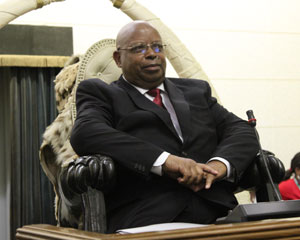
Speaker of the National Assembly Jacob Mudenda yesterday blasted Zimbabwe Electoral Commission chairperson Justice Rita Makarau and her commissioners for lack of seriousness on electoral reforms after they failed to turn up for a workshop to discuss the contentious issue.
BY VENERANDA LANGA
The workshop in Bulawayo was meant to discuss a petition to Parliament by the Elections Resource Centre (ERC) and 14 other civic society groups on alignment of the Electoral Act to the constitution.
Only one ZEC commissioner Sibongile Ndlovu attended the workshop sponsored by the Southern Africa Parliamentary Support Trust (SAPST) and the Zimbabwe Institute.
“Send a message to Makarau that the Speaker was not impressed that Zec is underrepresented because the issue that revolves around the ERC petition centres to a large extent on ZEC and therefore why this under representation?” Mudenda said.
“The flip side of that means that you do not respect Parliament, yet when you read section 119 of the constitution on the role of Parliament is that it must protect the constitution and promote democratic governance in Zimbabwe, and ZEC manages the electoral system.”
He said Zec had failed to uphold the Constitution which stipulates that all institutions and agencies of government at every level must act in the national interest.
Ndlovu later revealed that Makarau was outside the country attending a Sadc meeting and had assigned a Bulawayo-based commissioner to represent her at the workshop.
- Chamisa under fire over US$120K donation
- Mavhunga puts DeMbare into Chibuku quarterfinals
- Pension funds bet on Cabora Bassa oilfields
- Councils defy govt fire tender directive
Keep Reading
Mudenda then turned his guns on Zimbabwe Human Rights Commission (ZHRC) chairperson Elasto Mugwadi and his commissioners who failed to turn up and had sent a junior officer Taipei Sibidi to represent them.
“ZHRC has a nine-member commission and take a message to them that they must not undermine the role of Parliament. After all, as ZHRC you are a creature of Parliament and you have to report to Parliament and issues that have arisen out of the electoral process relate to human rights,” he said.
“Tell them that if they do not want to work for the state and the people of Zimbabwe they must resign,” Mudenda added to the applause of MPs from the Parliamentary Portfolio Committee on Justice.
Mudenda said voter education needed to be intensified, adding statistics of past elections had revealed serious voter apathy in Zimbabwe.
“I was very shocked to see 1980, 1985 and 1996 figures,” he said.
“During the 1996 presidential elections there were 4 822 299 registered voters but only 1 557 558 people voted, which is 32% people that voted. Why?
“In 2002 there were 5,5 million registered voters but only 3 130 000 voted. There is something wrong somewhere.
“During the 2005 National Assembly elections 5,6 million people were registered as voters but only 2,6 million voted.
“In the 2005 senatorial elections three million voters were registered but only 631 000 voted.”
Mudenda said voter apathy was also exhibited in 2013 when out of the 5 874 110 people registered to vote only 3 480 000 or 59,2% voted.
“Generally, those people that vote have not scored more than 25% except for 2013 which means there is something wrong somewhere,” he said.
“Our electoral law systems must answer those questions.”
The top Zanu PF politician said elections had created a lot of problems where there was jostling for positions and constituencies.
“Although there is multi-party democracy, but is there democracy in the choice of candidates to occupy party seats? The object of the electoral law must be to create political space to campaign freely and peacefully,” Mudenda said. He questioned the rationale of civic society organisations pushing for electoral changes 12 months before elections.
ERC director Tawanda Chimhini said if elections were held next year without the alignment of electoral laws with the constitution, the outcome could declared unconstitutional.
He said the basis for their petition were to challenges generally faced during elections where people called for a clear legal framework for administering elections, and issues to do with challenges in the political environment, and the need for electoral reforms.
He said the petition noted seven issues that needed to be urgently rectified in the Act which included voter education where section 40 of the Electoral Act limits organisations from doing voter education.
“When civic society tries to conduct voter education we have faced arrests to the extent of approaching the Constitutional Court,” he said.
“Zimbabweans must also have access to voter registration.
“Parliament must consider how we can refine the Act so that Zimbabweans can register to vote.
“The political environment must also be free of violence, and we insist the code of conduct which is part of the Electoral Act must contain punitive measures.”
The ERC petition also demanded the right to vote for Zimbabweans in the Diaspora.










